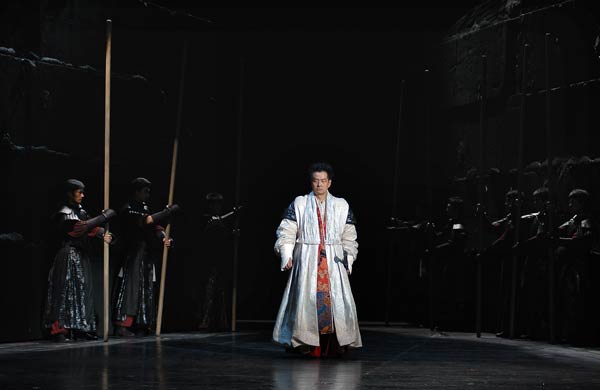History under a new light
Updated: 2013-11-01 00:51
By Raymond Zhou (China Daily)
|
||||||||
A trilogy of historical drama presents situations seemingly remote from our daily lives but with haunting resonance.
 |
|
Pu Cunxin, arguably the reigning king of Chinese stage, plays Zhao Xiangzi. Provided to China Daily |
There is a gallery of assassins in Records of the Grand Historian, China's best-known history book, which is over 2,000 years old. Playwright Xu Ying did not pick Jing Ke, the most often retold of them all, but "the most extreme one" in his eyes.
Yu Rang, a member of Minister Zhi Bo's coterie in the Kingdom of Jin, sets as his mission to kill Zhao Xiangzi because Zhao has killed Zhi during a military campaign. Yu is repeatedly thwarted in his plot against Zhao but set free by Zhao who appreciates his loyalty to his slain employer. Loyalty drives revenge, but what is the fundamental cause for Yu's loyalty?
Yu offers the ultimate rationale, which has now become a familiar refrain of the Chinese lexicon: "One dies for someone who understands him." Yu's employer, or patron, not only understood him, but treated him with respect. In a rigid hierarchy where equality is non-existent, it is something of a marvel indeed.
What complicates the matter is the target of Yu's revenge. Whether in history or in this dramatic retelling, Zhao is not a tyrant. As embodied by Pu Cunxin, arguably the reigning king of Chinese stage, Zhao, despite his streak of arrogance, is prone to bouts of forgiveness. Even when he commits an act of violence, he tends to be soul-searching, concerned with his image as a king in the public eye.
Questions both Zhao and the audience want to ask of Yu: Zhi was not Yu's first patron, but replaced him in a similar twist that killed him. Why was Yu willing to be Zhi's protege, but not Zhao's? Doesn't Zhao treat him with enough respect as well?
The fascination of Xu's play lies in the ambiguity. The main character of Yu Rang can be read in many ways, as a symbol of loyalty or one of blind loyalty, or someone who is obsessed with the notion of loyalty.
"What I want to show is the paradox in Yu Rang," explains Xu Ying the playwright. "Yu is fully aware that he is defending the honor of a bad politician and attempting to assassinate a good one. But he uses a standard higher than what we know in the mundane world. Specifically, it is 'yi', which is not exactly the same as 'zhong (loyalty)'. Politicians of that era work from court to court, kingdom to kingdom, without a sense of betrayal. 'Yi' is more like faith, but not in a religious connotation. It could be faith in a person and it requires the ultimate sacrifice if necessary."
Xu believes that director Lin Zhaohua deliberately blended the two concepts to drive home a point that is poignant in modern China, and a personality defect at the heart of the tragedy. But the real tragedy, he insists, is at a spiritual level.

 Post-baby Duchess
Post-baby Duchess
 Victoria Beckham S/S 2014 presented during NYFW
Victoria Beckham S/S 2014 presented during NYFW
 'Despicable' minions upset Depp's 'Lone Ranger' at box office
'Despicable' minions upset Depp's 'Lone Ranger' at box office
 'Taken 2' grabs movie box office crown
'Taken 2' grabs movie box office crown
 Rihanna's 'Diamonds' tops UK pop chart
Rihanna's 'Diamonds' tops UK pop chart
 Fans get look at vintage Rolling Stones
Fans get look at vintage Rolling Stones
 Celebrities attend Power of Women event
Celebrities attend Power of Women event
 Ang Lee breaks 'every rule' to make unlikely new Life of Pi film
Ang Lee breaks 'every rule' to make unlikely new Life of Pi film
Most Viewed
Editor's Picks

|

|

|

|

|

|
Today's Top News
China securitization plan to include foreign banks
Firms heading home as benefits wane in China
China's PMI growth hits 18-month high
China 'urges' US to explain phone taps
US students compete in Chinese
The Chinese dream in ink
China condemns Japan's 'dangerous provocation'
Freer RMB 'can answer US claims'
US Weekly

|

|








